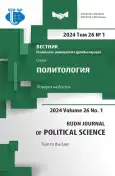The Need to Overcome the Cultural Hegemony of the West in Political Science on The Example of the Problem of Contemporary Islamist Terrorism
- Authors: Pochta Y.M.1
-
Affiliations:
- RUDN University
- Issue: Vol 26, No 1 (2024): Turn to the East
- Pages: 7-17
- Section: Editorial
- URL: https://journal-vniispk.ru/2313-1438/article/view/322442
- DOI: https://doi.org/10.22363/2313-1438-2024-26-1-7-17
- EDN: https://elibrary.ru/IAXJGV
- ID: 322442
Cite item
Full Text
Abstract
Using the example of the problem of contemporary terrorism, the article raises the question of the need to overcome the dependence of Russian science on the hegemony of the West. In the world in general and in Russia in particular, the period of admiration for the Western concept of liberal democracy and the concepts of globalization, human rights, soft power, civil society, democratic transition, terrorism, hybrid wars, etc., developed by liberal thought, is coming to an end. These theories are increasingly less accepted in as normative, universal, whose implementation necessarily requires Western supervision. These theories, developed during a unique historical process in Western countries, cannot be adequately applied to determine the direction of development of non-Western countries. In this study, we consider the problem of contemporary Islamist terrorism as a concrete example of the need for a critical revision of Western ideas. To do this, we turn to the ideas of a number of Russian authors, as well as Western representatives of postmodernism, neo-Marxism and left-radical thought, who sharply criticize the basic dogmas of Western liberal political science. This allows us to conclude that Islamist terrorism is not the result of the activities of individual radicals or a manifestation of the aggressive nature of Islam, but is reproduced by the conflict system of modern international relations. Thus, Islamist terrorism as a radical form of politicization of Islam is most often a reaction of the Muslim world to Western globalism, to the crisis of a number of Muslim societies as a result of Western intervention. The system-functional approach makes it possible to understand the place and role of Islamist terrorism in contemporary hybrid wars, which the West uses to maintain its global empire. Islamist terrorism can be viewed as an element of a system of hybrid wars. In this system, along with Islamist terrorism, there is an important phenomenon of combating it - anti-terrorism, and also, along with Islamist terrorism as the activity of non-governmental armed groups, there is state terrorism, mainly carried out by Western states.
About the authors
Yuriy M. Pochta
RUDN University
Author for correspondence.
Email: pochta_yum@pfur.ru
ORCID iD: 0000-0001-9600-2665
SPIN-code: 5600-3410
Dr. of Sc. (Philosophy), Professor, Department of Comparative Politics
Moscow, Russian FederationReferences
- Baudrillard, J. (2016). The spirit of terrorism. There was no Gulf war. Moscow: RIPOL classic. (In Russian).
- Chomsky, N. (2007). Hegemony or survival: America’s quest for global dominance. Moscow: Stolitsa-Print publ. (In Russian).
- Chomsky, N. (2019). Optimism over despair: On capitalism, empire and social change. Moscow: RIPOL Classic / Pangloss. (In Russian).
- Dugin, A.G. (2011). Archeomodern. Moscow: Arktogeya (In Russian).
- Hardt, M., & Negri, A. (2006). Multitude: War and democracy in the age of empire. Moscow: Cultural Revolution publ. (In Russian).
- Kaldor, M. (2015). New and Old Wars: Organised Violence in a Global Era. Moscow: Gaidar Institute publ. (In Russian). [Kaldor, M. (1999). New and Old Wars: Organized Violence in a Global Era. Stanford: Stanford University Press].
- Karaganov, S. (2021). On the Third Cold war. Russia in Global Politics, 4, 21–34. (In Russian). http://doi.org/10.31278/1810-6439-2021-19-4-21-34
- Kara-Murza, S.G. (2011). Crisis social science. Part one. Lecture course. Moscow: Scientific expert (In Russian).
- Phares, W. (2005). Future Jihad: Terrorist strategies against America. New York: Palgrave Macmillan.
- Phares, W. (2012). The coming revolution: Struggle for freedom in the Middle East. Moscow: EKSMO publ. (In Russian).
- Pochta, Y.M. (2021). Islamist terrorism in the context of contemporary hybrid wars. Vestnik RUDN. International Relations, 21(4), 734–746. (In Russian). http://doi.org/10.22363/2313-0660-2021-21-4-734-746
- Said, E.W. (2012). Culture and Imperialism. St. Petersburg: “Vladimir Dal” (In Russian) [Said, E.W. (1993). Culture and Imperialism. New York: Knopf.].
- Scahill, J. (2015a). Blackwater: The rise of the world’s most powerful mercenary army. Moscow: Kuchkovo pole publ.; Institute for Foreign Policy Research and Initiatives. (In Russian)
- [Scahill, J. (2007). Blackwater: The rise of the world’s most powerful mercenary army. New York: Nation Books].
- Scahill, J. (2015b). Dirty wars: The world is a battlefield. Moscow: Kuchkovo pole publ. (In Russian). [Scahill, J. (2013). Dirty wars: The world is a battlefield. New York: Nation Books].
- Tsygankov, A.P. (2021). A Great Enough Power. Russia in global politics, 4(110). (In Russian). http://doi.org/10.31278/1810-6374-2022-20-2-206-212
Supplementary files









